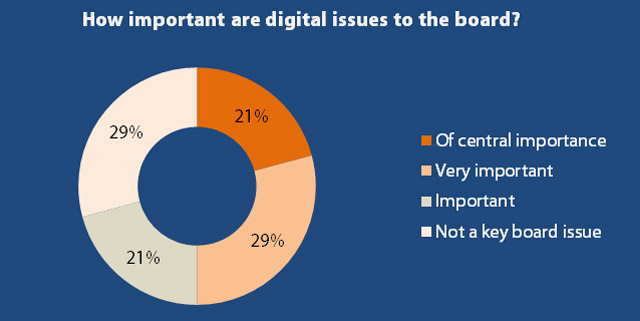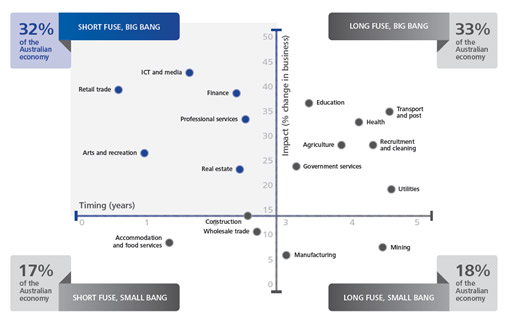-
Ask yourself this question - is digital in your company's DNA? If the answer is 'no' or even 'not really' then this story is for you.
The issue of digital literacy on boards is something I have been passionate about since the turn of this century. Some 14 years ago, I delivered an impassioned plea to a lunchtime audience of mostly senior executives in Sydney to take the issue of "e-commerce" seriously.
"Digital disruption is not just around the corner, in many industries it is already here."
Andrew Grill, Global Managing Partner, IBM Social ConsultingThe talk explored how to find themselves digital mentors who could help "navigate them through the e-commerce minefield".
Fast forward to 2015, and we no longer talk about "e-commerce" (it is simply commerce). However, the issue of digital literacy remains, in my opinion, a much more important issue than it was back in 2001.
In 2015 it has the ability to affect the stock prices of publicly listed companies in the short to medium term if left unchecked.
In my position with IBM, I am fortunate to travel the world and speak to the most senior of our clients about social business, digital transformation and collaboration.
I see firsthand how companies are struggling to ensure the C-Suite can quickly grasp the impact of digital disruption being felt across all industries. Digital disruption is not just around the corner, in many industries it is already here.
One good example of digital disruption in the banking industry is the Polish bank mBank. It was started in 2000 as a direct bank by its parent BRE Bank, and so successful was the model, that in 2013, mBank became the bank's main brand.
There have been many examples of major banks starting small, agile digital outfits to address the impacts of digital disruption. The mBank example is interesting in that BRE decided that they would disrupt themselves, rather than being disrupted.
IBM's Institute for Business Value will be releasing their Global banking study later in August that looks at the impacts of digital disruption and the opportunities for banks to respond and benefit from this.
I have been privy to some early results from the study and they support my view the leading global banks that respond and adopt to the onset of digital disruption will outperform their peers by a considerable margin, while also delighting customers, reducing costs, and improving operational efficiencies.
SO WHY IS DIGITAL DISRUPTION SUCH A BIG DEAL?
New research revealed by MIT's Center for Information Systems Research puts the threat of digital disruption in stark business context. According to the study, board directors estimate that 32 per cent of revenue is at risk over the next five years due to digital disruption.
At a recent MIT Sloan CIO Symposium Jennifer Banner, a board member of the Federal Reserve Bank of Atlanta, said that digital disruption is one of the “squeaky wheels” in corporate board rooms.
What concerned me back in 2001 still concerns me today. Fourteen years on many of the boards of ASX listed companies don't have the digital leadership they need.
In London, where I have lived for the last nineyears, the same problem exists. A 2014 study by Korn Ferry showed that only 1.8 per cent of FTSE 100 companies had board members that could honestly call themselves "digital", so clearly this is a global problem, not just restricted to Australia.
{CF_IMAGE}
This issue can be fixed quite easily. As we have seen with Qantas and Fairfax appointing Todd Sampson to their boards having a different perspective can help companies see differently, identify new opportunities and keep ahead of the digital curve.
Back in 2001 when I delivered my impassioned speech in Sydney, no one seemed to take any notice. I received warm applause and knowing nods, but perhaps I was too young or too naïve to think business leaders at the time would or could take the threat of digital disruption seriously.
THE RISE OF THE DIGITAL DISRUPTOR
Over the last few years there have been a number of high-profile digital disruptors. I have highlighted just a few below:
- WhatsApp – the messaging platform bought last year by Facebook for $US19 billion. In January, WhatsApp reported that they now have 700 million users, and that they send 30 billion messages a DAY, through their website. This is compared to SMS at 20 billion a day when you add up all messages sent worldwide.
This is digital disruption in the telco space at a massive scale. The question that investors need to ask is what are the mobile operators doing to ensure they don't get locked out by over the other top messaging players like Snaptchat, Facebook Messenger and Apple's iMessage.
- HMV in the UK was an iconic record chain. Two years ago in 2013 they went bust. What went wrong? The company did not predict the rapid uptake in streamed and online music.
In 2015, I don't own a single CD. I sold them all last year as I can access each and every single one for the price of a cup of coffee each month on Spotify.
WHAT ARE THE CHARACTERISTICS OF TODAY'S DIGITAL DISRUPTORS?
The emergence of small, nimble competitors in the music (Spotify), video (Netflix), transport (Uber) and accommodation industries (Airbnb) is making established companies sit up and take notice.
Spotify and their competitors are massively disrupting the record industry model. Their model still hasn't been proven, and even artists like Taylor Swift continue to boycott the site, but consumers are moving to always on, always available music.
The future of video is of course with companies such as Netflix, who have just launched their service in Australia. Almost overnight, Australia's internet bandwidth doubled as a direct result of the Netflix launch. Senior executive in Australia in any industry cannot afford to ignore the signs.
These nimble start-ups don't have the legacies that many ASX listed companies have and the reason they can outmanoeuvre older, more established companies is because digital is in their DNA, providing them the ability to leapfrog technological advances.
Which board wants to be the one that was disrupted by the next Uber?
LEARNING THE LANGUAGE OF DIGITAL
Across the board, I still see senior executives and board members that are struggling to keep up with the effects of digital disruption. In some ways this is linked to their ability to become fluent in the new language of digital.
This is not something that can be fixed overnight and it is far more complex than placing the nearest millennial in front of them to explain what all the social and digital jargon means.
Importantly, the skills required to operate digitally in the C-Suite cannot be imparted in a simple training course.
My view is the unstoppable impact of digital disruption it can only be properly conveyed by someone who:
- is young enough to have been playing with digital for a number of years, and;
- experienced enough to be able to understand the inner workings of a complex business and translate this into 'digital speak'.
People who have these characteristics can be found as non-executive directors (NEDs) sitting on boards across multiple industries around the world.
They don't provide infrequent advice or come in for an inspirational session then leave. Instead they ensure the business is seen through a digital lens at each and every board meeting.
ENGAGING DIGITALLY SAVVY NEDS
So where can digital NEDs be the most effective? To work this out, I turned to a report by Deloitte Australia from 2012 entitled “Digital disruption, short fuse, big bang”.
In it Deloitte look at industries very likely to be disrupted by digital and identify industries at risk of a 'short fuse, big bang'.
Companies most at risk of being disrupted, such as those in finance, professional services and retail, need to be looking for digital NEDs right now.
A digital NED is also unique in that they are young enough to have been playing with digital all their life, and experienced to be able to operate at board level as a senior executive. They sit in this unique sweet spot.
{CF_IMAGE}
DIGITAL DISRUPTION IS HERE – YOU NEED TO ACT NOW
The time is now – companies can't wait. Customers and shareholders can't wait. If you are in a leadership position you would be challenging your board on this – what is your digital strategy as well as your digital NED strategy?
Digital disruption should not be seen as a threat, it should be embraced as an opportunity to transform your company.
Andrew Grill is Global Managing Partner, IBM Social Consulting. The opinions expressed here are his own and don't necessarily represent IBM's positions, strategies or opinions. Andrew can be found on Twitter @AndrewGrill . He blogs at http://londoncalling.co
The views and opinions expressed in this communication are those of the author and may not necessarily state or reflect those of ANZ.
- WhatsApp – the messaging platform bought last year by Facebook for $US19 billion. In January, WhatsApp reported that they now have 700 million users, and that they send 30 billion messages a DAY, through their website. This is compared to SMS at 20 billion a day when you add up all messages sent worldwide.
-
-
EDITOR'S PICKS
-
One of the biggest challenges for CEOs is making sure they have the right people to cope with the future – a near impossible feat for the rapidly changing digital age. Across the Asia Pacific, the speed of change is reshaping the way we live and work and business strategies are undergoing a fundamental re-think.
15 June 2015 -
'Silicon Valley is coming' says JP Morgan.
2 July 2015 -
We're all fascinated by how radically technology may change our lives in the future. From the smartphone to driverless cars to 3D printing we're constantly rethinking how gadgets might make daily life easier.
1 July 2015


